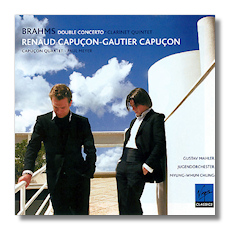
The Internet's Premier Classical Music Source
Related Links
- Brahms Reviews
- Latest Reviews
- More Reviews
-
By Composer
-
Collections
DVD & Blu-ray
Books
Concert Reviews
Articles/Interviews
Software
Audio
Search Amazon
Recommended Links
Site News
 CD Review
CD Review
Johannes Brahms

- Double Concerto for Violin, Cello & Orchestra, Op. 102 1
- Clarinet Quintet in B minor, Op. 115 2
1,2 Renaud Capuçon, violin
1,2 Gautier Capuçon, cello
2 Paul Meyer, clarinet
2 Aki Saulière, violin
2 Béatrice Muthelet, viola
1 Gustav Mahler Jugendorchester/Myung-Whun Chung
Virgin Classics 3-95157-2 DDD 72:21
Although they are infrequent disc-mates, Double Concerto and Clarinet Quintet go together nicely, primarily because they both are late works. In fact, the Double Concerto, completed in 1887, was Brahms' last symphonic work. (He would live for another decade, however.) The Clarinet Quintet was composed in 1891. The adjective "autumnal" frequently is applied to both works, presumably because they are reflective but not tragic in tone. They seem to look back on both good times and bad with a wistful smile. Both works also were written for specific virtuosos admired by the composer. The Double Concerto solidified the reconciliation between Brahms and violinist Joseph Joachim – long-time friends (and also colleagues) who had fallen out a few years earlier over a personal matter. The Clarinet Quintet was written for Richard Mühlfeld, a fine clarinetist who inspired several other works from this period.
I suppose it was only a matter of time before the Capuçon brothers recorded the Double Concerto. Still, they are quite young to be playing such an inward concerto, and the contrast is compounded by their being accompanied by the Gustav Mahler Youth Orchestra, whose young members come from all over Europe. (The booklet lists all of them, and their countries of origin.) Perhaps surprisingly, though, this is a very laid-back reading of the Double Concerto – even more "autumnal" than usual. From the very start, Myung-Whun Chung emphasizes short, sighing phrases, gives the soloists plenty of room in which to think over the material, and establishes relaxed tempos. Much of the drama has been drained away, but somehow, one doesn't mind, because the playing is so melting and warm. If there's any competition between the two soloists inherent in this work, the Capuçons ignore it and present, if not a united front, then at least a complementary one. I'm not sure this is my favorite recording of the Double Concerto, but it is so unlike others, I'm certainly going to hang onto it. Curiously, it appears to have been recorded over the course of three days in three different Austrian cities! (One can't tell from the recording.)
We already knew that the Capuçons were fine chamber musicians too, and it is good to hear proof of that once again in the Clarinet Quintet. Meyer's clarinet is the soul of refinement. Again, this is an intimate, restrained work, but it is made even more so here – "hush-hush" is the first description that came to mind. Both here and in the Double Concerto, one might argue that the playing is almost precious at times. I really wonder what Brahms himself would have thought of it. In any case, this is a very tender performance, and easy to enjoy in the way that a hot bath also is. A little more fizz would have made me enjoy it even more, though.
Copyright © 2008, Raymond Tuttle




















